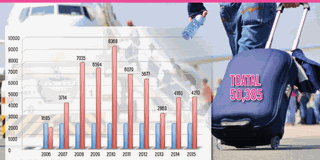Museveni's daughter, in-law, among owners of firms exporting labour to Middle East

What you need to know:
Proprietors. List of labour exporters names Public Service minister Muruli Mukasa and Brig Leopold Kyanda, the Uganda People’s Defence Forces’ Chief of Staff for Land Forces, as proprietors of companies exporting labour mainly to the Middle East
KAMPALA.
A list of companies involved in the lucrative but controversial export of labour to the Middle East has revealed that firms owned by senior government and military officials are among the top labour exporters.
The list from ministry of Gender, Labour and Social Development – a copy of which this newspaper has seen – reveals that a total of 58 companies are licensed to export labour. The list is soon to be presented to Parliament’s committee on Gender and Social Affairs.
On August 14, Parliament demanded that the Labour ministry presents a list of companies that are involved in the export of Ugandan workers and their directors. This followed persistent reports that Ugandan migrant workers being abused in the Middle East.
The list of labour exporters names Public Service minister Muruli Mukasa and Brig Leopold Kyanda, the Uganda People’s Defence Forces’ Chief of Staff for Land Forces, as proprietors of companies exporting labour mainly to the Middle East.
Brig Kyanda is listed as a director in Normandy Company Uganda Ltd while minister Mukasa is listed as a director in Fountain Security Services Limited.
The President’s son-in-law, Mr Odrek Rwabwogo and wife Patience Rwabwogo are also listed as directors of The Gideon’s Men Limited, one of the companies exporting labour to the Middle-East.
Mr Mukasa yesterday told this newspaper that Fountain Security Services was licensed to export labour long before he joined government service. He said he sold his “little shares” and resigned all positions in the company upon becoming a public servant.
“When the company was licensed, I was not even in the ministry of Labour. As soon as I became a minister, I relinquished my position. I had little shares which I sold. The licensing process is straightforward. There is no way undue influence can be exerted. It is not easy to exert influence for a company to be licensed. Licences are processed by a committee which is not solely managed by the Gender ministry,” Mr Mukasa explained this newspaper when contacted on Sunday.
Brig Kyanda when contacted on Monday refused to respond to inquiries about Normandy Company Ltd, saying he is “not directly involved in [its] running” and referred questions to Mr Charles Adrole, the company chairman, who only said the “company is properly registered” to export labour.
When contacted by telephone yesterday, Mr Rwabwogo refused to discuss his involvement in the export of labour to the Middle East and referred inquiries about his stake in The Gideon’s Men Limited to the Registrar of Companies. “Why single out Mr Rwabwogo as an individual? If individual X is involved [in exporting labour], does that change the fact that it is a good or bad thing for the country? Just go to the Registry of Companies and verify the legal ownership [of The Gideon’s Men Limited]. That is the best way you can do it,” Mr Rwabwogo said. An Internet search on the website of the Uganda Registration Services Bureau (URSB) revealed that the company was registered on January 9, 2007 under registration number 86828. We could, however, not obtain the names of the directors from the website.
Statistics from the Labour department show that between 2006 and 2015, more than 50,000 Ugandan migrant workers employed abroad passed through the government’s labour programme. The highest number of Ugandan workers exported in a single year to countries like the United Arab Emirates, Qatar, Saudi Arabia, Bahrain, Iraq, Kuwait and Afghanistan was 8,363 in 2010.
However, the programme recently hit headlines over the continued abuse and brutalisation of Ugandan migrant labourers, especially domestic workers in the Middle East countries. Upon a visit by Uganda’s envoy to Saudi Arabia last year, it was confirmed that 21 Ugandans were being held at a Saudi detention facility in Riyadh.
Despite the government’s freeze on export of labour to the Middle East, many companies are still involved in the trade. This is driven primarily by the high youth unemployment in the country who are keen to take on what they believe are well-paying jobs.
Labour minister, Mr Herbert Kabafunzaki said on Sunday in telephone interview that the Ministry intends to have a review of companies dealing in the labour export to weed out the unscrupulous ones involved in human trafficking.
“The list is there. We have 58 companies that are exporting labour but we are going to review it to see which company is still eligible. There are some companies that are involved in human trafficking,” Mr Kabanfuzaki said.
In a telephone interview yesterday, Mr Kabanfuzaki said: “I don’t know what list you have but if it has 58 companies including Muruli Mukasa and other companies , then, it’s the one we have.”
Last month, the Police Commissioner for Anti-Human Trafficking, Mr Moses Binoga, revealed that more than 180 Ugandan maids had reported incidents of mistreatment by their employers in Middle East countries since January.
According to the 2015 Bank of Uganda statistics, migrant workers who have passed through the externalisation of labour programme remit back to Uganda an average of $2m per month.



